James Gunn’s The Suicide Squad (2021), the sort-of sequel to David Ayer’s Suicide Squad (2016) is an onion of a movie.
As you watch, you peel back layer after layer to find that it is much more than a comic book action movie about a bunch of supervillains forced together into a Special Ops “Suicide Squad.” Yes, it is about that (and the movie has all the action and gore to show for it) but it’s also about family, the struggle of the disenfranchised, and, most interestingly, American imperialism. While the film somewhat succeeds in addressing these topics with nuance and care, James Gunn’s obsession with violence, gore, and shallow comedy bogs the movie down, often directly contradicting those more serious subjects. Overall, though, I have so much admiration for this movie, despite its flaws. Spoilers ahead~
The Characters
As many of us know by now, James Gunn excels in writing character-driven stories and the “found family” trope, as evidenced by the success of Guardians of the Galaxy and Guardians of the Galaxy Vol. 2. So, it’s no surprise that the characterization in The Suicide Squad is fantastic. Every character feels fleshed out and has an emotional arc.
Ratcatcher 2
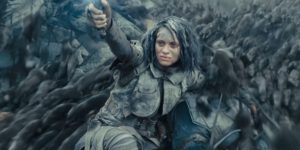
Ratcatcher 2 is truly the heart of this film and the glue of this team. Daniela Mechior is a delight to watch, stealing every scene with her charm and a smile that could melt even the heart of a man-eating shark. Ratcatcher 2 as the relentlessly friendly, sincere, kind young woman is the perfect foil to the closed-off, aggressive Bloodsport and their other murderous teammates. Her backstory is one of the most touching moments of the movie, shown with beautiful visuals of her previous life reflected on the bus window behind her silhouette. Melchior’s narration over the images is heartbreaking, making it one of the few truly emotional moments of the movie. Her father (Taika Waititi) says that if rats, the “scourge of society,” can be helpful, then maybe they — the people at the bottom of society — can be helpful, too. This message is one of the best things about this film. Ratcatcher 2’s story is, deep down, the true theme of The Suicide Squad: The poor, the vulnerable, the disenfranchised are not worthless; they have value and have the potential to do great things, too. Ratcatcher 2 and her rats saved the day at the end of the movie, proving that message true through wonderful circular storytelling.
Rick Flag

Rick Flag (Joel Kinnaman) gets a pretty compelling storyline, too. Since Flag was in the first Suicide Squad, we get to delve more into his character. I much prefer Flag in this movie, where he is developed as an individual and as a friend. Given that he and Harley are the only two members of the first Suicide Squad to return in this movie, their history and friendship is given more weight. Flag changing the mission to save Harley made him much more likable. Then, Flag gets one of the most riveting scenes in the movie when he discovers that the U.S. captured Starro and has been performing brutal experiments on innocent civilians. Flag has always been an unquestioning soldier for Waller and the U.S. government, but here he betrays them and decides to do what is right and reveal what they have been doing to the public. Being a loyal soldier, used as a pawn in a game he didn’t know about, I really felt for Rick. This was a clear parallel to real life soldiers and state employees. I was shocked when he was killed by Peacemaker — it didn’t seem likely they would kill one of the leads from the first movie (However, Gunn makes it clear from the start he is unafraid of killing any character). Flag’s emotional arc is amazing to watch. His death is so gut-wrenching because Flag finally goes against orders to do something for himself and the good of the people, only to get killed by Peacemaker. Even Flag himself is shocked, and his last line left me with goosebumps.
“Peacemaker… what a joke.”
Peacemaker
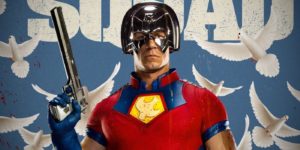
Peacemaker (John Cena) is one of the most interesting villains I’ve ever seen. He’s played as simply another teammate, a rival for Bloodsport, and a heartless killer. I couldn’t root for him even before it was revealed that he was the true villain of the movie. And when he was (and then “killed” by Bloodsport), I was a bit relieved that he was no longer being played as a protagonist because he’s simply so unlikeable. Peacemaker reminded me in some ways of John Walker in Falcon and the Winter Soldier. Like John, Peacemaker kills without remorse, works as a covert agent for the U.S. government and allows them to use his body as a weapon at the expense of his moral integrity. However, Peacemaker is far worse than John in that he kills much more and with delight. Like they suggest earlier in the movie, he’s just a man using peace as an excuse to do whatever he wants. I can’t see how they could center him as the protagonist of his own show — this man should rot in jail, not save the world — but we’ll see what Gunn comes up with on HBO Max.
Polka-Dot Man
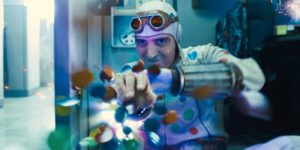
Polka-Dot Man (David Dastmalchian) is another scene-stealer in this film. Reimagining his powers as debilitating body horror was a unique and good choice on Gunn’s part. Dastmalchian plays the character as awkward, afraid but brimming with rage, and suicidal. Polka-Dot Man’s powers come from parental abuse, too. I wish these things had been explored more, but not by Gunn. Gunn insensitively plays Polka-Dot Man’s mental illness and disability for laughs. For some reason, Polka-Dot Man sees his mother everywhere, which felt strange to watch. When the audience laughed at her appearances, I could not. The joke was overdone by the end of the movie. I pitied Polka-Dot Man more than anything, so when his care for others (like when he accidentally killed Milton) or his disability (the polka dots growing on his body) were played as jokes, I couldn’t laugh along because it felt callous. Why ask the audience to empathize with a character and then make a joke out of him? Nonetheless, his character arc was one of the most compelling: all he wanted to do was be a superhero, be a good person. And when Polka-Dot Man finally got what he wanted, he was unceremoniously squashed by Starro. For me, his death hit hard because of how sympathetic and fleshed-out he was.
Harley Quinn

Harley Quinn (Margot Robbie) is also fantastic in this movie. Harley is a well-done combination of sexuality and strength. After romancing Presidente General Silvio Luna (Juan Diego Botto), she kills him, in true Harley fashion. Why can’t a girl have fun before she kills the bad guy? It always feels like Harley is in control of the situation, even when she’s in dire circumstances, making her one of the best (albeit insane) female protagonists I’ve seen onscreen. One of my favorite Harley scenes was when she was tied to the ceiling and used her legs to lift a man and kill him with nothing but her own strength.
Bloodsport
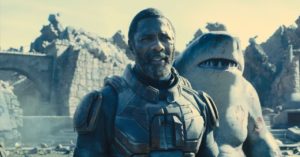
As for Bloodsport (Idris Elba), Elba’s suave charisma sells Bloodsport as a good guy when it sometimes seems like he’s uncaring. It’s Bloodsport’s friendships with Ratcatcher 2 and Rick Flag that make him more sympathetic, along with his hidden desire to be a good father. His phobia of rats is played for laughs at first, but once the backstory behind it is revealed, he becomes even more intriguing to watch.
The Plot
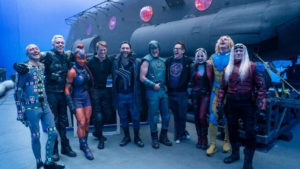
Suicide Squad’s plot is complex and well-written, but Gunn’s stylistic choices when it comes to the visuals and comedy detract from it. The opening scene in which the “bait team” are sacrificed to help the main team succeed is where most of my issues lie. We are introduced to new, interesting characters played by a ridiculously star-studded cast, but all of their talents are wasted in under ten minutes. The movie teases its audience with the great potential of characters like Javelin (Flula Borg) and Savant (Michael Rooker), then undermines itself by killing them in brutal ways. I was particularly disappointed by the demises of TDK (Nathan Fillion) and Blackguard (Pete Davidson) simply because I was looking forward to seeing the actors. And then Gunn chose to have lingering shots on each their massacred bodies to rub it in. When Gunn turns to senseless violence and gratuitous gore is when the movie stumbles along its path into something that feels shallow and just plain cruel in an effort to seem gritty and cool. There are quite a few scenes that exhibit this: the two scenes of bird murder, the multitudinous long shots of mutilated bodies, the massive amount of detailed gore throughout the film, and the killing competition between Bloodsport and Peacemaker.
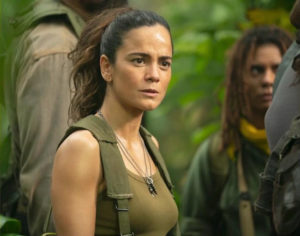
That final scene is one of the most problematic: Peacemaker and Bloodsport see who can kill more people more effectively, but really, it’s more brutally. They torture an entire camp of people to death only to find out that the people they killed were the good guys — rebels against the despotic regime in Corto Maltese. But the killing is played for laughs, as an “Oops!” moment from the Suicide Squad. Nobody faces repercussions for it, and the rebels’ leader, Sol Soria (Alice Braga), never seems that angry that they slaughtered her entire family. It also didn’t feel right that these Americans came in and killed a bunch of foreign POC/Latines fighting for justice in their own country. Maybe it’s a veiled critique of the way America gets involved in the politics of smaller, unstable countries, but it isn’t done nearly as well here as it is later on in the movie.
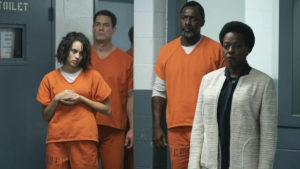
When it was revealed that the American government took Starro from its home and used a smaller, less developed country as a hidden base for human experimentation to weaponize the alien, I was impressed. This twist makes the American government and Amanda Waller (Viola Davis) the real villains in a way that feels scarily similar to real life. I appreciated this commentary on American imperialism and foreign policy. Yet, the Suicide Squad physically fights aliens and the foreign Latine governmental officials and soldiers of Corto Maltese, never coming face to face with the American government that truly created this entire situation. This movie goes there on a lot of subjects, and it tries to go there with this, but it could go farther. Amanda Waller gets knocked out, which was rewarding to see, but she gets back up and presumably resumes control with no problem. Peacemaker lives while Rick Flag remains dead. Will the Suicide Squad ever confront the real villains that force them to do these suicide missions? I doubt it, but only time will tell.
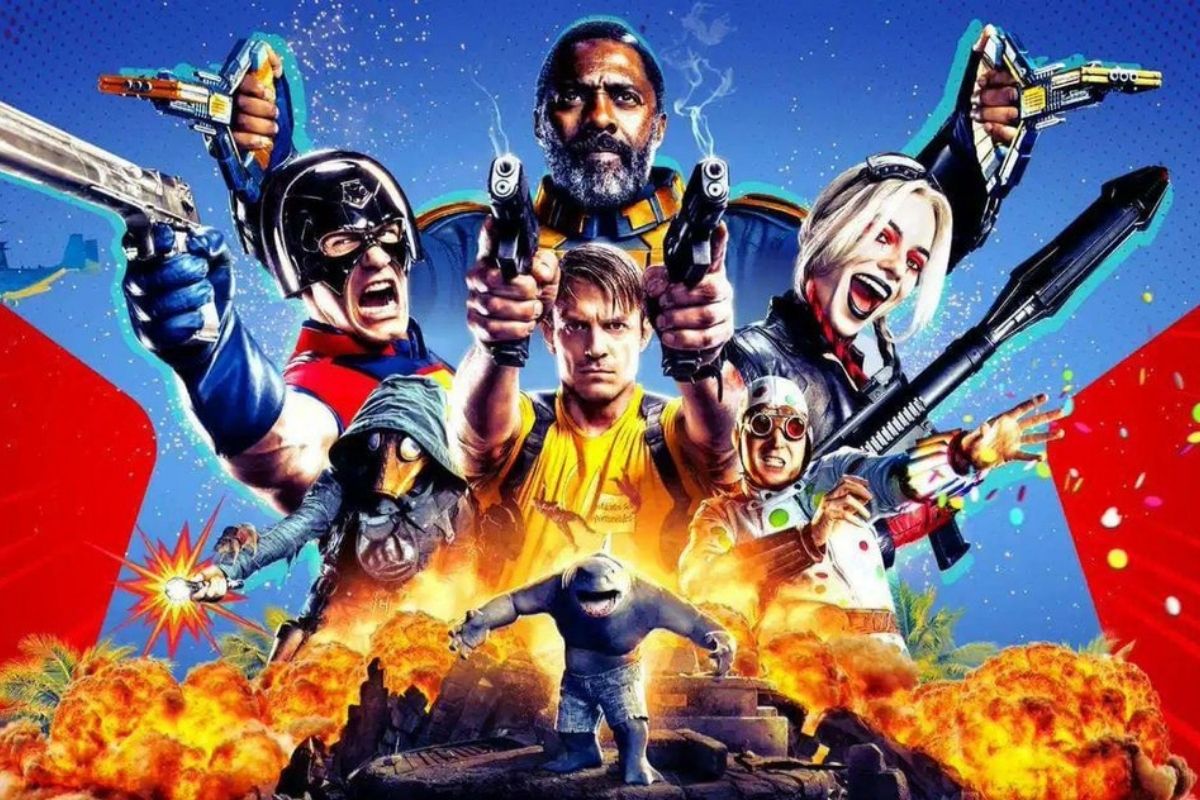
Comments